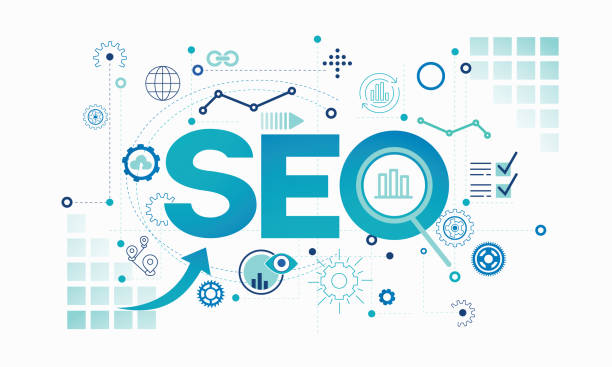Introduction to Search Engine Optimization and Its Importance
In today’s highly competitive digital world, the visibility of your website among a multitude of information, is of vital importance.
This is where the concept of #Search_Engine_Optimization or SEO comes in.
SEO is a set of techniques and strategies used to increase a website’s ranking in the organic search results of engines like Google, Bing, and Yandex.
This complex but entirely logical process makes your website more understandable and appealing to search engine algorithms.
Why is SEO important? Because most internet users use search as the starting point for finding the information, products, or services they need.
If your website does not appear on the first pages of search results, it will practically be invisible to a large portion of your target audience.
The importance of SEO is not limited to just increasing traffic; it also helps improve traffic quality and reach target users.
Imagine you have an online store for handmade products.
With proper optimization, you not only attract more visitors but also bring those to your website who are truly looking for handmade products.
This educational and explanatory approach to how search engines work helps you implement more effective strategies for your online presence.
Without SEO, even the best content and products might get lost in the vast ocean of the internet.
SEO is a long-term investment that brings sustainable results for your business and solidifies your position in the digital competition.
Are you dissatisfied with the low conversion rate of visitors to customers on your e-commerce site?
Solve this problem forever with professional e-commerce website design by Rasaweb!
✅ Increase visitor-to-customer conversion rate
✅ Create an excellent user experience and build customer trust
⚡ Get free consultation
Internal SEO or On-Page Optimization
Internal optimization, as its name suggests, refers to all actions taken within the website itself to improve its ranking in search engines.
This part of SEO includes numerous elements, each playing a significant role in helping search engine crawlers understand your content.
The first step in internal SEO is keyword research.
Finding the words your target audience uses for their searches is the cornerstone of any successful SEO strategy.
After identifying keywords, you should use them naturally and logically within your page content.
Other key elements include optimizing the page title (Title Tag), meta descriptions (Meta Description), and heading tags (H1, H2, H3).
The page title should be engaging, contain the main keyword, and be less than 60 characters.
Meta descriptions should also provide a brief and compelling explanation of the page content to encourage users to click.
Correct use of heading tags provides logical structure to your content, making it easier for users and search engines to read.
Optimizing images with appropriate Alt tags helps increase accessibility and also assists search engines in understanding the image content.
This is a specialized approach that requires precision.
Page Speed is also an important factor in internal SEO.
Pages that load faster provide a better user experience, and search engines also give them a higher ranking.
Internal Linking, which means linking related pages to each other within the website, helps crawlers discover all your pages and also transfers value and authority between different pages.
This comprehensive guide helps you properly lay the foundations of your internal SEO and pave the way for visibility.
External SEO or Off-Page Optimization
Unlike internal SEO which focuses on elements within the website, external SEO refers to a set of activities and strategies performed outside your website to improve its credibility and ranking in search results.
The most important and influential factor in external SEO is backlinks.
A backlink means links given from other websites to your website.
These links act like a vote of confidence from other websites, and the more authoritative and relevant the linking website, the greater its value for your SEO.
Search engines consider backlinks as a sign of your content’s credibility and value.
The quality of backlinks is much more important than their quantity.
A backlink from an authoritative and high-authority website (like Wikipedia or a well-known news website) can be dozens of times more valuable than many backlinks from low-authority and irrelevant sites.
Link-building strategies include creating engaging content that naturally attracts backlinks (link bait), guest posting on other blogs, or participating in specialized forums.
This process requires an analytical approach to identify quality backlink sources and establish effective communication with them.
In addition to backlinks, Social Signals also have some impact on external SEO, although their weight is not as significant as backlinks.
Sharing your content on social media can help increase visibility and traffic, which in turn indirectly impacts your SEO.
Ultimately, external SEO is a vital aspect of a comprehensive SEO strategy that adds credibility and authority to your website in the eyes of search engines, and alongside internal SEO, ensures your ranking reaches its peak.
In the table below, you can see the main differences between internal and external SEO:
| Feature | On-Page SEO | Off-Page SEO |
|---|---|---|
| Location of Action | Inside your website | Outside your website |
| Key Factors | Keywords, Title, Meta Descriptions, URL Structure, Page Speed | Backlinks, Domain Authority, Social Signals |
| Controllability | Full control | More limited control (requires communication and attraction) |
| Main Goal | Improving content relevance to search, improving user experience | Increasing website credibility, authority, and trust |
Click here to preview your posts with PRO themes ››
Technical SEO: The Foundation of Every Successful Website
Technical SEO deals with the technical aspects of your website, ensuring that search engines can easily find, crawl, index, and rank your website.
This part of SEO is often invisible to users but plays a fundamental role in the success of your overall optimization strategy.
Website loading speed is one of the most important factors in technical SEO.
Both users and search engines prefer faster websites.
Tools like Google PageSpeed Insights can help you identify and resolve speed issues.
Another increasingly important factor is mobile-friendliness.
Due to the significant increase in smartphone usage for internet access, Google penalizes websites that are not optimized for mobile.
Responsive Design is the best way to ensure a seamless user experience across all devices.
XML Sitemap and Robots.txt files are also other specialized and vital elements.
A sitemap provides search engines with a list of all important pages on your website so that no page is missed, while Robots.txt tells engines which pages to crawl and which to ignore.
SEO-friendly URL structure, the use of SSL (HTTPS) for website security, and preventing Duplicate Content are also concerns of technical SEO.
Having an SSL certificate not only increases your website’s security but also counts as a positive signal for ranking in Google.
Identifying and resolving issues related to 404 errors or Broken Redirects is also essential for maintaining your website’s health.
This explanatory and technical part of SEO is the foundation of any successful optimization strategy and should be continuously reviewed and improved so that your website is always ready to respond to the changing algorithms of search engines.
Are you dissatisfied with the low conversion rate of visitors to customers on your e-commerce site?
Solve this problem forever with professional e-commerce website design by Rasaweb!
✅ Increase visitor-to-customer conversion rate
✅ Create an excellent user experience and build customer trust
⚡ Get free consultation
Content is King in the World of Content SEO
In the world of SEO, there is a famous saying: “Content is King.”
This phrase clearly demonstrates the unparalleled importance of producing high-quality and valuable content for success in search engine optimization.
Search engines primarily aim to provide the best and most relevant answers to users’ questions, and this is where your content plays a pivotal role.
But what is meant by quality content? Content that is comprehensive, accurate, unique, and useful for your target audience.
Merely stuffing text with keywords will not only fail to help your SEO but may also lead to penalties by Google’s algorithms.
There are various types of content you can produce for your SEO strategy.
In-depth blog articles, comprehensive guides, FAQs, infographics, videos, and podcasts can all help attract organic traffic.
Your content should not only be informative but also be able to capture and retain attention.
You can even use entertaining content to create more engagement and sharing, which indirectly has a positive impact on your ranking.
A key tip is to write your content around the needs and questions of your audience.
For successful content SEO, you should naturally incorporate your keywords into the text, titles, subtitles, and image descriptions.
Also, content length can be important; studies have shown that longer and more comprehensive content often ranks higher because it fully addresses a topic and satisfies user needs.
Regularly updating old content and adding new information also shows that your website is active and up-to-date, which is itself a positive signal for search engines.
By focusing on producing valuable and targeted content, you not only attract users but also increase your website’s credibility in the eyes of search engines, paving the way for sustainable SEO success.
The Role of User Experience (UX) in Improving SEO
In recent years, search engines have increasingly focused on user experience (UX) as an important factor in page ranking.
An excellent user experience not only keeps users satisfied but also sends positive signals to Google and other search engines, which can help improve your SEO ranking.
Factors such as page loading speed, responsive design for mobile, easy navigation, and content readability all directly impact UX and, consequently, SEO.
One of the most important user signals that Google pays attention to is Bounce Rate.
A high bounce rate indicates that users quickly leave your page after landing on it, which could be due to irrelevant content, confusing design, or slow speed.
A low bounce rate and long Dwell Time indicate user satisfaction with your content.
Creating engaging content that encourages users to interact and read more is highly effective here.
A website with an appealing visual design, logical structure, and ease of use keeps users engaged for longer and increases their likelihood of returning.
Furthermore, Accessibility is also a part of UX that is considered important for SEO.
Ensuring your website is usable for people with disabilities is not only ethically correct but can also help expand your audience and improve your search ranking.
Analyzing user behavior with tools like Google Analytics is essential to understand how they interact with your website.
This analytical approach allows you to identify and address your UX weaknesses.
Ultimately, focusing on improving user experience is not only beneficial for your users but is also one of the smartest strategies for comprehensive SEO improvement and achieving top results in search engines.
Click here to preview your posts with PRO themes ››
Key SEO Tools and Data Analysis
Success in SEO is almost impossible without the right tools.
These tools allow you to monitor your website’s performance, find new keywords, analyze competitors, and identify technical issues.
Some of these tools are free, while others offer more specialized and advanced features for a fee.
Google Search Console (GSC) and Google Analytics are two free and essential tools from Google that you should definitely use.
Search Console provides you with information on how your website appears in search results, indexing issues, backlinks, and crawl errors.
Google Analytics provides comprehensive information about user behavior on your website, such as incoming traffic, traffic sources, time spent on page, bounce rate, and conversions.
This data is crucial for performing a precise analysis of your SEO performance.
In addition to Google’s tools, there are also paid and more advanced tools that offer broader capabilities.
Among the most popular are Ahrefs, SEMrush, Moz, and KWFinder.
These tools are designed for keyword research, competitor analysis, backlink profile examination, and rank monitoring.
Choosing the right tool depends on your needs and budget.
To start, GSC and Google Analytics provide excellent guidance and sufficient data for initial SEO improvement.
As your strategies progress and become more complex, you can move towards paid tools.
It’s important to use the data these tools provide correctly and make data-driven decisions.
Only through continuous monitoring and precise analysis can problems be discovered and optimization strategies improved.
Below, you can see a table categorizing SEO tools:
| Tool Category | Description | Sample Tools |
|---|---|---|
| Website Analysis | Reviewing website performance, traffic, user behavior | Google Analytics, Hotjar |
| Keyword Research | Finding high-volume and relevant keywords | Google Keyword Planner, Ahrefs Keyword Explorer, KWFinder |
| Competitor Analysis | Examining competitor SEO strategies, backlinks, and keywords | SEMrush, Ahrefs Site Explorer, Moz Link Explorer |
| Rank Monitoring | Tracking keyword positions in search results | SEMrush, Ahrefs Rank Tracker, AccuRanker |
| Technical SEO | Identifying and resolving website technical issues | Google Search Console, Screaming Frog SEO Spider |
Local SEO: A Solution for Local Businesses
For businesses that serve customers in a specific geographical area, Local SEO is a vital strategy.
This type of optimization helps you appear in local search results, where users are looking for businesses or services near them.
Imagine you have a restaurant in Tehran; your customers are likely to search for “restaurant in Tehran” or “restaurant near me.”
Local SEO ensures that your restaurant is displayed at the top of the list in these types of searches.
The most important tool for local SEO is Google My Business (GMB).
Registering your business on GMB and completing the profile accurately and comprehensively, including address, phone number, working hours, photos, and customer reviews, plays a very important role in your visibility in Google Maps results and the Local Pack.
Optimizing your GMB profile is a key guideline for any local business.
Customer reviews and their ratings are also very influential in local SEO; positive reviews can attract user trust and improve your ranking.
Local Citations also hold high importance.
These listings include your business’s Name, Address, and Phone number (NAP) in online directories like Yelp, Foursquare, and similar websites.
Consistency of NAP information across all these platforms is very important.
Any inconsistency can send negative signals to search engines and lower your ranking.
Following news and updates related to Google’s algorithms in the local SEO domain can also help you stay one step ahead and adjust your strategies accordingly.
Local SEO is a great opportunity for small and medium-sized businesses to gain a share of the online market, even in competition with larger brands.
Did you know that 94% of a first impression of a company is related to its website design?
Rasaweb, by providing professional corporate website design services, helps you create the best first impression.
✅ Create a professional and trustworthy image for your brand
✅ Easier attraction of potential customers and improvement of online presence
⚡ Get free corporate website design consultation
Challenges and Future Trends in Optimization
SEO is a dynamic and evolving field that presents new challenges and opportunities to specialists with every update to search engine algorithms and the emergence of new technologies.
One of the biggest future trends is Artificial Intelligence (AI) and machine learning.
Algorithms like Google RankBrain and BERT have shown that Google is increasingly focusing on understanding the meaning behind searches, not just keywords.
This means that producing comprehensive and high-quality content that addresses the user’s Search Intent is becoming increasingly important.
Voice Search is also on the rise.
With the widespread use of voice assistants like Siri, Google Assistant, and Alexa, optimizing for voice search has become a necessity.
These types of searches are usually longer and more conversational (“How’s the weather in Tehran?” instead of “Tehran weather”).
Your content should be able to answer these questions directly and concisely.
Creating engaging content that naturally covers these questions can be highly effective in this area.
Video SEO is also growing; given the popularity of platforms like YouTube, optimizing video titles, descriptions, and tags for search engines and attracting traffic this way is very important.
Core Web Vitals have also been introduced as an official ranking factor by Google, indicating Google’s commitment to providing the best possible user experience.
This analytical trend shows that SEO is no longer limited to keywords but includes a deep understanding of user behavior and continuous website improvement based on it.
The challenge is to always keep up with changes and update your strategies.
By focusing on producing valuable content, providing an excellent user experience, and embracing new technologies, you can lead in the competitive world of SEO and make the best use of future opportunities.
Click here to preview your posts with PRO themes ››
Conclusion and Next Steps for SEO Success
As we saw in this comprehensive guide, SEO is a multifaceted and ongoing process that includes technical, content, and off-site aspects.
It is a long-term strategy that requires patience, effort, and continuous updates.
Success in SEO means having a deep understanding of how search engines work and prioritizing user needs.
By focusing on these two principles, your website will not only achieve a higher ranking in search results but also attract higher quality traffic, leading to increased conversion rates and ultimately, the growth of your business.
To start and continue on the path to SEO success, there are a few essential steps: First, conduct comprehensive keyword research to identify the best opportunities.
Then, focus on improving your website’s internal SEO, including content optimization, page speed, and mobile compatibility.
Next, plan a strong strategy to attract high-quality backlinks and increase your domain authority.
Using SEO tools to monitor performance and identify issues provides a clear explanation of your current status.
Don’t forget that the world of SEO is constantly changing, so continuous learning and staying updated with the latest algorithms and trends are vital.
This educational article gives you a solid foundation to start.
With patience, effort, and persistence, you can witness a significant increase in organic traffic and the growth of your business in the digital world.
SEO is not just a technique, but a philosophy for visibility and effective communication in the online space.
By adhering to these principles, your path to achieving the peaks of search success will be paved.
Frequently Asked Questions
| Question | Answer |
|---|---|
| What is SEO? | SEO, or Search Engine Optimization, is the process of increasing the quality and quantity of website traffic by improving a site’s ranking in natural (organic) search results of search engines like Google. |
| What are the main types of SEO? | SEO is divided into three main categories: On-Page SEO, Off-Page SEO, and Technical SEO. |
| What does On-Page SEO include? | On-Page SEO includes optimizing elements within the website, such as keywords, page title (Title Tag), meta descriptions (Meta Description), content, URL structure, images, and internal links. |
| What is Off-Page SEO? | Off-Page SEO refers to activities outside the website that help improve its ranking, such as backlink building, social media marketing, and brand mentions. |
| What is Technical SEO? | Technical SEO deals with optimizing the technical aspects of a website to help it be better crawled and indexed by search engines. This includes site speed, mobile-friendliness, site structure, sitemaps, and Robots.txt files. |
| What role do Keywords play in SEO? | Keywords are phrases that users enter into search engines. Proper and targeted use of relevant keywords in content and site elements helps search engines understand your page’s topic and display it for relevant searches. |
| What is a Backlink and why is it important? | A backlink, or inbound link, is a link from one website to another website. Backlinks act as a “vote of confidence” from other sites for search engines and play an important role in the credibility and ranking improvement of a site, especially if they are from authoritative sites. |
| What impact does quality content have on SEO? | Quality content that is relevant, comprehensive, and unique not only attracts and retains users but also shows search engines that your page is valuable. This helps improve ranking, reduce bounce rate, and increase user dwell time on the site. |
| Why is site loading speed important for SEO? | Site loading speed is an important ranking factor for Google. Faster sites provide a better user experience, have lower bounce rates, and are preferred by search engines. |
| Is SEO a one-time process? | No, SEO is a continuous and long-term process. Search engine algorithms are constantly changing, competition is increasing, and website content also needs updates. Therefore, SEO requires continuous monitoring, analysis, and optimization. |
And other services of Rasaweb Advertising Agency in the field of advertising
Smart Marketing Automation: An effective tool for user interaction with precise audience targeting.
Smart UI/UX: A dedicated service for growth in customer behavior analysis based on marketing automation.
Smart Digital Branding: A combination of creativity and technology to increase website visits using real data.
Smart Link Building: A fast and efficient solution for customer acquisition focusing on marketing automation.
Smart UI/UX: Transform sales increase by optimizing key pages.
And over a hundred other services in the field of internet advertising, advertising consulting, and organizational solutions
Internet Advertising | Advertising Strategy | Advertorial
📍 Rasaweb Afarin Digital Marketing Agency is with you on the path to achieving digital success. From custom website design to SEO optimization and advertising campaign management, we offer innovative solutions for your business growth.
📍 Tehran, Mirdamad Street, next to Central Bank, Kazeroon Janoubi Alley, Ramin Alley, No. 6














